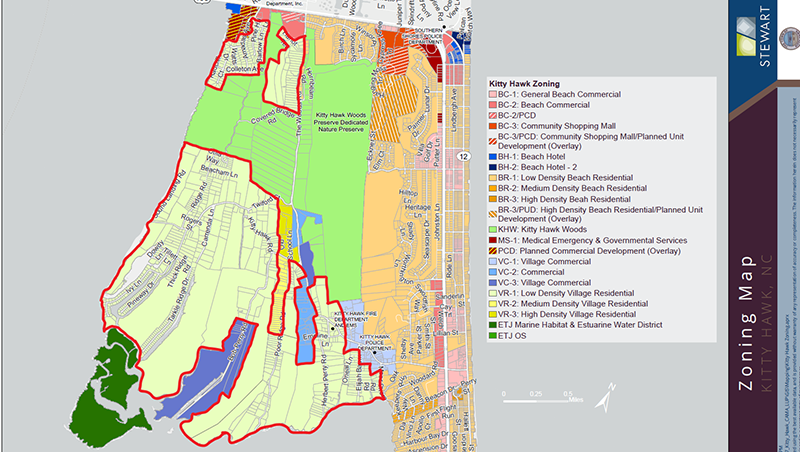Potential ADU regulations continue to spark debate in Kitty Hawk
Published 9:31 am Wednesday, January 31, 2024

- A proposed text amendment aims to regulate accessory dwelling unit uses within Kitty Hawk’s VR-1 district (highlighted in red) in the hopes of preventing further use of two short-term rentals on one piece of property. Courtesy Town of Kitty Hawk
|
Getting your Trinity Audio player ready...
|
Further discussion was had regarding proposed changes to accessory dwelling unit (ADU) uses within Kitty Hawk’s VR-1 district at the town’s monthly planning board meeting on January 18.
The applicant of this proposed text amendment for ADUs aimed for three main outcomes:
- New ADUs permitted in the VR-1 district after potential adoption are to be used as long-term rentals or residences;
- Pre-existing ADUs used for transient rentals can continue with a long-term resident or homeowner in principal dwelling;
- ADUs should be located behind the primary dwelling.
Amy Wells, the applicant, was present for the evening meeting and shared with the board that her intention was to “start a conversation” and possibly come to an agreement about what might be best for the town in regard to ADUs and short-term rentals (STR). Her main concern was to prevent further use of two short-term rentals on one piece of property. “You can’t imagine the disruption this has to everyday life,” Wells said.
The proposed amendment seeks to define AUDs and specify its uses: “for storage, garages, workshop of other like uses and shall not contain more than 200 square feet of habitable space.” It goes on to outline terms such as “long-term occupancy” and “transient rental structure,” and suggests that either the principal use structure or the ADU shall be occupied by the property owner or long-term resident as their primary residence. Town planner Rob Testerman added that in a case where a property is operating STRs out of both their primary structure and ADU, they would have a set period of time to convert one of those units to long-term occupancy if the text amendment were adopted.
Several public commenters were dismayed by the proposal. Joe Anlauf expressed his concern about the potential for the proposal to take away individual property rights, and felt like it should not be up to the residents of Kitty Hawk to “fix the affordable housing problem.”
Duke Geraghty, the government affairs director for Outer Banks Home Builders Association, pointed out some areas of concern within the text. He commented that locating an ADU behind the primary dwelling may not be possible in some cases; septic fields could pose an issue. Noting that it could be a point of contention, Geraghty was unsure why prior permitted uses would be required to conform to the new requirements. “People count on this money to qualify for their mortgages,” he offered. He also noted that 200 sq. ft. is “not a lot of space” and thought overall, there was some tweaking needed before this amendment could be considered.
Grace Anlauf took to the podium following Geraghty. She shared that as a Realtor, she knew of prior buyers who had purchased their home with the intention of using it as a STR. While with time these homeowners may change occupancy to long-term use, she said a STR may be deemed a property’s “highest and best use” by the current owner as it stands. “Taking away the ability for the homeowner to make that decision for their own personal situation infringes on their personal property rights.” She mentioned that implications may not only affect a homeowner, but also Realtors who have sold those properties, lenders who qualify the mortgages and then future individuals who are looking to buy and may need STR income to pay their mortgages.
Board member Jim Geraghty was one of the first to speak up as the members entered their discussion regarding the proposed text amendment. He expressed concern over approving the conversion of a property that had been built to code and complied with the standards set out at the time of completion. “It’s just nonconforming then … to arbitrarily say they have to meet the new code, well they built it to code.”
Vice Chair Bryan Parker acknowledged the need for affordable housing. While an effort was made on that front in the form of ADU allowance, Parker admitted it had the opposite effect. Where this proposal is not the “end all be all,” he said it’s at least “somewhere to start,” pointing out that the VR-1 district is labeled a “low density area,” and to put two STRs on one property is having an adverse effect on density.
Board member Matt Spencer agreed with the comments made by Joe Anlauf: “Eliminating short term rentals is not in best interest of the town.” He recognized the problems STRs pose for those who reside in residential areas, and offered that he would be on board for additional parking regulations, noise regulations and perhaps regulating trash disposal to try and reduce the impact to the town’s full-time residents. “But to tell somebody that you can never use an ADU for a short-term rental just doesn’t seem right.”
Spencer also piggy-backed off of Duke Geraghty’s comments, concurring that there were “tons of legal questions” within the drafted text. The town attorney was not present for the meeting to answer inquiries.
Alternate member Blair Meads pointed out that the area had just experienced one of the highest demands in real estate on record, and such was the case for STRs. He felt giving things more time to work themselves out was fair. “A lot of these smaller structures that were put in Airbnb program, we may see those things be long-term rentals this year and next. I think that this is going to begin to work itself out on its own.” Geraghty agreed.
Craig Merrill was under the impression that the board may be dealing with competing objectives: the desire to maintain the town’s unique character with controlled growth and the desire to not impact individual property owner’s ability to make a profit. “This seems like an important conflict to me … I don’t know the right answer, but they are mutually exclusive.” The alternate member felt it was in the best interest of the town to not opt for an extreme outcome either way.
The board was in agreement to table discussion to their February meeting. They asked the applicant if she was on board to go back to the town’s planner with her proposal. With a slew of questions for the town attorney, the board hoped to discuss the matter further while he was in attendance at their next meeting.
SUBSCRIBE TO THE COASTLAND TIMES TODAY!






